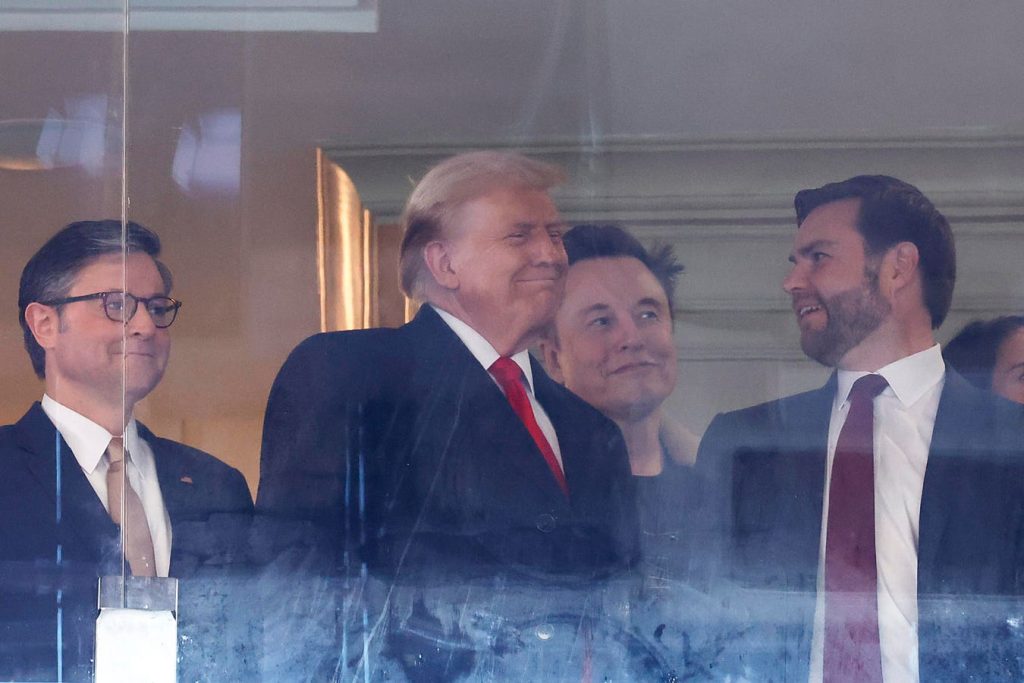The looming threat of a government shutdown just days before the holiday season underscores the volatile political landscape and the potential for significant dysfunction in the upcoming legislative session. A bipartisan deal, painstakingly negotiated by House Speaker Mike Johnson and his Democratic counterparts, was abruptly derailed by influential figures within the “Make America Great Again” movement, including former President Donald Trump and billionaire Elon Musk. Musk’s critique of the deal, disseminated through his social media platform X, contained misinformation and falsehoods, further inflaming the situation. Trump and Vice President-elect JD Vance solidified the opposition, issuing a joint statement that effectively killed the bill’s chances in the Republican-controlled House. This incident foreshadows the challenges ahead, given the narrow Republican majority and the demonstrated willingness of Trump and his allies to undermine even their own party’s leadership. The historical precedent of multiple government shutdowns during the previous period of unified Republican control reinforces these concerns.
The focal point of Trump and Vance’s opposition was a surprising demand to address the federal debt ceiling, an issue not previously part of the shutdown negotiations. While Trump’s argument about the inherent contradiction of the debt ceiling – it doesn’t prevent spending but limits paying for already incurred expenses – holds merit, his position represents a stark reversal from his previous stance during the Biden administration, when he urged Republicans to oppose raising the debt ceiling. This shift likely stems from Trump’s desire to avoid a national conversation about the unsustainable fiscal trajectory, particularly in light of his own agenda to extend and expand the 2017 tax cuts, which would further exacerbate the debt issue. Trump’s opportunistic use of the debt ceiling debate highlights his willingness to manipulate fiscal policy to serve his own political interests.
House Democratic Leader Hakeem Jeffries, recognizing Trump’s strategic maneuver, has rejected any attempt to link the continuing resolution to the debt ceiling. Given the narrow Republican majority and internal divisions on the debt ceiling issue, securing passage of any related legislation without Democratic support is highly improbable. This presents an opportunity for Democrats to address the debt ceiling issue strategically, potentially neutralizing it while simultaneously holding Trump accountable for the fiscal consequences of his policies. One such approach would be to extend the current debt-ceiling suspension through the end of Trump’s term in 2029, but with a crucial caveat: if Trump signs any deficit-increasing reconciliation bill, the suspension automatically ends. This “poison pill” would force Republicans to choose between offsetting the cost of tax cuts, pursuing bipartisan tax reform, or triggering a debt-ceiling debate that exposes their contribution to the national debt.
An alternative strategy for Democrats involves advocating for a more effective mechanism for managing the national debt, such as the Responsible Budgeting Act. This legislation would automate debt ceiling suspension upon adoption of a budget resolution or allow presidential suspension contingent on the submission of a credible deficit reduction plan to Congress. Such a process would foster fiscal discipline and hold the governing party accountable for its fiscal policies, replacing the current practice of recurring debt ceiling crises. This approach represents a more sustainable and responsible long-term solution compared to the politically charged brinkmanship that characterizes current debt ceiling debates.
Addressing the debt ceiling is a critical policy objective that warrants bipartisan collaboration. However, Trump’s willingness to jeopardize government operations and exploit the debt ceiling for political gain raises serious concerns about the potential for future instability and partisan gridlock. If Democrats choose to concede to Trump’s demands on the debt ceiling, it is imperative that they do so in a manner that prioritizes responsible fiscal management and prevents further exacerbation of the national debt. This requires a strategic approach that safeguards against Trump’s budget-busting policies and promotes long-term fiscal stability.
The recent near-shutdown serves as a stark reminder of the challenges facing the incoming administration and the delicate balance of power in Congress. Navigating the complex political landscape will require careful negotiation, strategic maneuvering, and a commitment to responsible governance. The debt ceiling issue, now inextricably linked to the government funding debate, presents a critical test of both parties’ willingness to prioritize the nation’s long-term fiscal health over partisan politics. The outcome will significantly impact the economic and political landscape for years to come.










